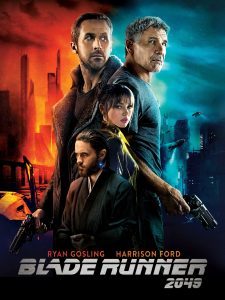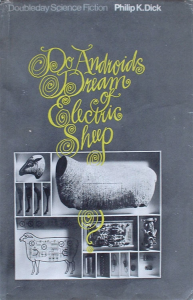Blade Runner 2049 is a deep and interesting film fueled by visual spectacle and cleverly-handled ambiguity. The film’s dialogue is sparse and carefully weighted, and the intricate plot resolves itself fairly satisfactorily (even though the film takes its sweet time getting there). Nonetheless, it fails to live up to its predecessor. It struggles to make headway with the theological commentary of the original – lines about Replicants being “angels” are unjustified, and are thankfully marginal. (more…)
Tag: Philip K. Dick
-
In the last week, we have received 12 donations totaling $2,325 for which we are enormously grateful. Our goal this year is to raise $70,000. So far, we have received 137 donations totaling $21,477.27. So we are more than 30% of the way there. See below for information on how you can give.
* * *
-
Czech translation here
Ridley Scott’s 1982 movie Blade Runner
is a science fiction classic and surely the director’s finest work. Blade Runner excels on all levels. It is a highly imaginative vision of the future realized with a stunning visual style. The script is intelligent, even poetic. The cast is uniformly strong, with a number of powerful performances, particularly Rutger Hauer as Roy Batty. The gripping action sequences are acrobatic, balletic, and brutal. But the key to the film’s unsettling emotional power is its deep mythic subtext. (more…)
-
Philip K. Dick’s 1968 science fiction novel Do Androids Dream of Electric Sheep? is far less famous than Ridley Scott’s 1982 movie Blade Runner
, which is loosely based on the novel. A few of the novel’s characters and dramatic situations, as well as bits of dialogue, found their way into Blade Runner, often shorn of the context in which they made sense. But the movie and novel dramatically diverge on the fundamental question of what makes human beings different from androids, and in terms of the “myths” that provide the deep structure of their stories. (more…)
-
3,548 words
The Man in the High Castle
Amazon Studios, created by Frank Spotnitz
2015-presentThe second season of the record-breaking show, The Man in the High Castle (hereafter TMHC), debuted last December on Amazon’s streaming service. The story is loosely based on Philip K. Dick’s novel of the same name, which establishes the setting: an alternative history scenario where the Third Reich and Imperial Japan won the Second World War and now (the show is set in 1962) occupy the United States, with Japan controlling everything west of the Rockies and Germany the Eastern seaboard. (more…)
-
1,818 words
 Blade Runner opened in movie theaters in the summer of 1982 just two weeks after Steven Spielberg’s more heralded E.T., which went on to become the all-time box office moneymaker. Blade Runner, with a $27.5 million budget, took in $27 million at the box office on its first run—hardly a smash—yet it proved its worth in the long run. Almost every science fiction film made since 1982 has been influenced by its production design, photography, and special effects. A new generation of fans has materialized and the film has spawned dozens of Websites on the Internet. (more…)
Blade Runner opened in movie theaters in the summer of 1982 just two weeks after Steven Spielberg’s more heralded E.T., which went on to become the all-time box office moneymaker. Blade Runner, with a $27.5 million budget, took in $27 million at the box office on its first run—hardly a smash—yet it proved its worth in the long run. Almost every science fiction film made since 1982 has been influenced by its production design, photography, and special effects. A new generation of fans has materialized and the film has spawned dozens of Websites on the Internet. (more…) -
August 18, 2015 Greg Johnson
Román Philipa K. Dicka „Sní androidi o elektrických ovečkách?“ coby antisemitská/křesťansko-gnostická alegorie
English original here
Sci-fi román Philipa K. Dicka z roku 1968 Sní androidi o elektrických ovečkách? se těší mnohem menší proslulosti než jím volně inspirovaný kultovní film Ridleyho Scotta z roku 1982 Blade Runner. Některé postavy, dramatické situace či útržky dialogů z knihy si našly cestu i do filmu, často vytržené z kontextu v němž dávaly smysl. Kniha a film se však dramaticky rozcházejí ve stěžejní otázce, čím se liší lidé od androidů a také v povaze „mýtu“, dodávajícího příběhům hlubší strukturu. (more…)
-
May 31, 2015 Trevor Lynch
Blade Runner
English original here
Film Ridleyho Scotta z roku 1982 Blade Runner se řadí mezi klasická díla sci-fi žánru a představuje vrchol tvorby slavného britského režiséra. Blade Runner vyniká ve všech ohledech. Jedná se o velice nápaditou vizi budoucnosti, uskutečněnou v dechberoucím vizuálním provedení. Herci předvádí solidní výkony, někteří pak až výjimečné – především Rutger Hauer jako Roy Batty. Napínavé akční scény jsou akrobatické, baletní a brutální. Klíč k pochopení znepokojivé emocionální působivosti díla však spočívá v jeho hlubokém mytickém podtextu. (more…)
-
Robert Ignatius Dillon
Beyond the Bush: A Hopeless Satire
Chicago: Hopeless Books, 2013Beyond the Bush is the third release from Ann Sterzinger’s Hopeless Books, and the first not from her own pen. Like Sterzinger’s own The Talkative Corpse [1] it reveals its Chicago origins by the frequent use of various derivatives of ‘jag-off’, and one might be tempted to christen it part of a ‘jag off lit’ movement, did it not sound so entirely like I was dismissing it as desultory and self-indulgent. (more…)
-
Czech translation here
Ridley Scott’s 1982 movie Blade Runner
is a science fiction classic and surely the director’s finest work. Blade Runner excels on all levels. It is a highly imaginative vision of the future realized with a stunning visual style. The script is intelligent, even poetic. The cast is uniformly strong, with a number of powerful performances, particularly Rutger Hauer as Roy Batty. The gripping action sequences are acrobatic, balletic, and brutal. But the key to the film’s unsettling emotional power is its deep mythic subtext. (more…)
-
Philip K. Dick’s 1968 science fiction novel Do Androids Dream of Electric Sheep? is far less famous than Ridley Scott’s 1982 movie Blade Runner
, which is loosely based on the novel. A few of the novel’s characters and dramatic situations, as well as bits of dialogue, found their way into Blade Runner, often shorn of the context in which they made sense. But the movie and novel dramatically diverge on the fundamental question of what makes human beings different from androids, and in terms of the “myths” that provide the deep structure of their stories. (more…)





